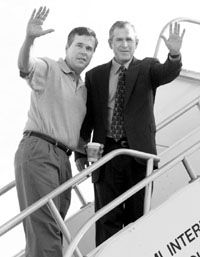The US presidential campaign ought to receive more media coverage in Ukraine, for its outcome will objective ly produce an impact on this country, political analyst Mykola Tomenko said at the round table, The US Presidential Elections: View from Ukraine.
He further stressed two aspects: the absence of ideology in the programs of both candidates, in contrast with those of their Ukrainian counterparts last year, and that the US presidential race had actually started from scratch. First, Republican George Bush, Jr. took the lead quite confidently. In August, however, his adversary, Democratic Vice President Albert Gore made several smart moves and caught up, so that now both stand an almost equal chance. Thus, Tomenko assumes, predicting victory on either side would be premature at the moment. There are a still tricks up both contender’s sleeves that could tip the scales. Mr. Tomenko believes the current resident of the White House is also an active participant in the campaign, and that he is likely to do something to support his fellow party member and second in command. Evidence is President Clinton’s decision to sell 30 million barrels of oil from the US strategic reserve (totaling half a billion barrels), and Albert Gore was the first to propose to use this reserve to overcome the current oil crisis. When asked whether Mr. Gore’s initiative would boost his popularity, Mykola Tomenko replied in the affirmative, noting that the man in the street, be it in the United States or Ukraine, likes his leaders to make practical decisions.
Prof. Oleksiy Haran of the Kiev-Mohyla Academy National University pointed out that as the US presidential race enters the home stretch the distinctions between the Democrats, considered Left, and Republicans, viewed as Right, are becoming increasingly blurred. Still, there are differences of principle rooted in the traditional ideological values of both parties. The Democrats want the federal authorities empowered to interfere in the social sphere for the public good. Thus, Mr. Gore proposes to use part of the federal budget to finance social needs. The Republicans prefer such intervention be focused on the business domain. Mr. Bush, acting in a typical American way wants taxes cut, among other things, to stimulate business activity.
Yevhen Kaminsky, head of the section for Europe and the Americas at the Institute of World Economics and International Relations, believes, “It has come time” for Ukraine “to part with illusions especially characteristic of the 1990s, that the West will help us.” He also assumes that Ukraine had reason to count on a Marshal Plan but failed to meet the American expectations, failing to fit into the established conduct pattern. Having proclaimed our [foreign political] course as one set on European integration, we discover that we are unable to follow it, Dr. Kaminsky emphasized. George Bush, Jr. and the White House take a dim view of phenomena taking place in Ukraine, primarily the absence of a realistic program of economic reform. The US press mostly associates Ukraine with the notorious name of Pavlo Lazarenko and rampant corruption.
The Democrats are conducting an active foreign policy, while the Republicans believe that the less US presence in the world, the better off Americans will be. Thus if Mr. Bush is elected President, Ukraine will have a hard time attracting American attention, Kaminsky predicts. But even if Mr. Gore is the next White House tenant, winning his administration’s favor will be possible only by showing actual progressive changes in Ukraine.
Oleksandr Derhachov, editor- in-chief of the journal Political Thought (published simultaneously in English, Ukrainian, and Russian — Ed.), considers the US as Ukraine’s very last strategic partner, and that Washington pays more attention to Ukraine’s geopolitical position than Europe does, even allowing for what goes on in this country. So far as the United States is concerned, Ukraine is a lever of influence on Russia. “America will be the last friend Ukraine will lose,” Mr. Derhachov stated. The White House and State Department are still showing a most benign attitude toward Ukraine, while in Europe we are “received in keeping with protocol, with documents signed at various levels, while real cooperation is noticeably decreasing.” He believes that the Republicans are tougher and more pragmatic. “Characteristically, they pay more attention to the creation of a favorable business climate,” he stresses. Nevertheless, he is convinced that the US factor will be present in the international and economic spheres of Ukraine, no matter what.
Mr. Tomenko feels positive that financial injections in Ukraine’s ailing economy will continue if the Democrats retain power in the United States, because Mr. Gore stresses his interest in the CIS in general and Ukraine in particular. The Republicans show more restraint in dealing with the CIS in general and Russia in particular. George Bush, Jr. advocates a revision of US financial aid being provided Russia. And yet, according to Tomenko, while the US administration has been speaking to Ukraine using two languages, one informal, calling a spade a spade, and the other formal, paying compliments, after this campaign the attitude could well change, for Ukraine has exhausted its credit of with the Yanks. Hence, Washington will use one language only. Mr. Kaminsky reminded journalists that, before Ukraine proclaimed its independence on July 16, 1991, the Ukrainian factor was absent from US politics, so that “we may once again find ourselves in that same zone indifference. Unless we give a fresh impetus to reform and really do something about corruption...”








